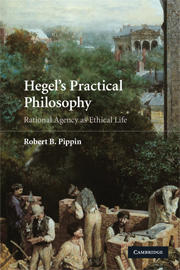9 - Institutional rationality
Published online by Cambridge University Press: 05 June 2012
Summary
“die Philosophie ist etwas Einsames.”
(Hegel, 1807)“Right is concerned with freedom,” Hegel notes in the Remark to §215 of his The Philosophy of Right, and freedom is “the worthiest and most sacred possession of man.” The question at issue has been in what Hegel thinks such freedom consists, and especially what acting in acknowledgment of its status as this “highest” value amounts to. The short answer to the first question is: freedom is a form (a distinct Hegelian, social form) of rational agency. The short answer to the second is that the full realization of such a dimension of human life requires active participation in certain modern institutions, a life in modern “Sittlichkeit.” As we have been seeing throughout, these two answers are interwoven and finally inseparable.
On the issue of freedom itself, the interpretation has been that while Hegel regards the expression of free agency – actions – as things done by agents intentionally, on intentions (or, said negatively, that we cannot demarcate the distinct events that are actions without taking account of the agent's own take on what is to happen and why), and while the formulation and execution of intentions is a matter of bringing practical reason, our deliberative capacity, to bear on what ought to happen, no account of this intra-psychic subjectivity can be complete or satisfactory without a proper appreciation of the nature of the dependence of this subjective side of the matter on the social world wherein such subjective takes are formulated and acted on, as well as contested, accepted, or rejected.
- Type
- Chapter
- Information
- Hegel's Practical PhilosophyRational Agency as Ethical Life, pp. 239 - 272Publisher: Cambridge University PressPrint publication year: 2008



